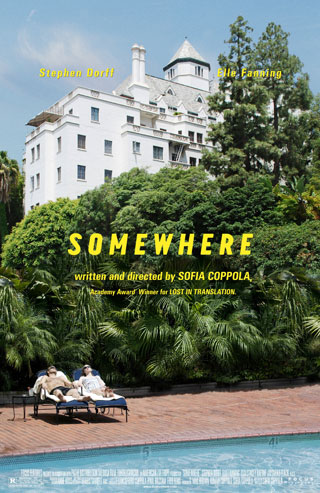
Though ostensibly from the perspective of Johnny (Stephen Dorff), a successful but dissipated actor who lets life happen to him, Somewhere is in truth another welcome, clear-eyed view of a girl's coming-of-age, something of a Sofia Coppola specialty, showcasing the alternately powerful and powerless feelings that define young womanhood. A gang of sisters (The Virgin Suicides), a queen and her court (Marie Antoinette) and an young wife abandoned in Tokyo (Lost in Translation) have made for previously engaging specimens. The French directors Francois Truffaut and Louis Malle -- directors who took their own experiences of childhood and adolescence and crafted them into parables of growing up -- are thus her storied ancestors: Coppola is our Newer Wave.
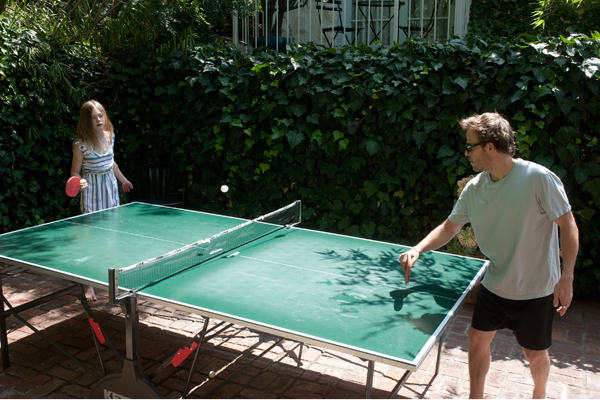
Was Cleo, (Elle Fanning), the preternaturally wise young lady who becomes her father's boon companion and eventually takes his life into her eleven-year old hands, even named after Anges Varda's character Cleo (Cleo de cinq a sept) who also tried to figure out what life was all about ?
Like David Russell (Spanking the Monkey) or Noah Baumbach (Squid and the Whale), Coppola has taken her cues from Europe rather than from our domestic larger-than-life filmmaking and Somewhere, set largely at LA's trendy Sunset Strip Chateau Marmont hotel is no different, the dark palette and décor and group living recalling an earlier, neo-Spanish, one-big-happy-Hollywood-family time.
But you don't have to know much about the French New Wave to get Coppola's films. Hermetically sealed, hothouse worlds of any kind can incubate strong feelings and daughters and their elusive fathers are an internationally rich subject. One of my favorite films is the Peter Sellers vehicle, The World of Henry Orient about another young girl who was so desperate to connect with her father she began to spy on him with a friend only to learn things she didn't really want to know. Cleo, an Eloise-at-the-Plaza, appears to have the sang froid of a girl much older but she also suffers from Too Much Information. Yet she is only silently judgmental about her father's girlfriends, stopping well short of turning into Paper Moon's Addie or Bonjour Tristesse's Cecile who actually plot to separate their fathers from their paramours.
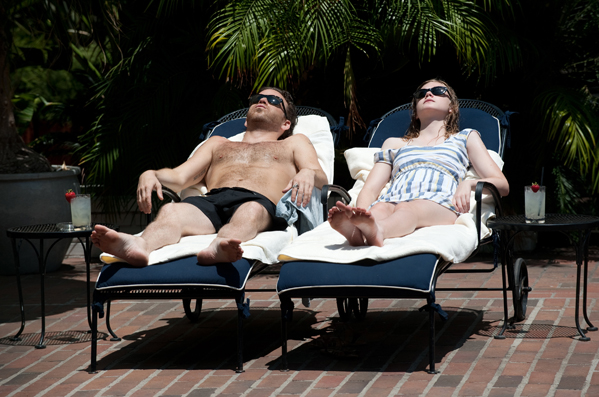
And as unavailable as he seems, Johnny's not unavailable in the most important way: emotionally. That a practically narcoleptic father who even nods off over twin in-room pole dancers at the outset eventually get his priorities straight is in the end more a matter of his growing up than it is of hers. Daughters and their fathers meet in Somewhere and recall the poignant Sondheim lyric that evokes a distant, magical, place where time together and time to care, time to learn and time to share is in plentiful supply.
In Somewhere they get this respite at first by one of only two plot devices: Cleo's mother abandons her to her ex (in an echo of Kramer Vs. Kramer), dropping her off with an indefinite return time because she needs "some space". In Cleo's world, then, Johnny is what passes for stable. Plus playing house with your father, even if it's the Chateau Marmont, a parallel universe of across-the-hall sex where one pill makes you happy and one pill makes you sad is, indeed, a lot of fun. Cleo cooks -- calling room service to get the ingredients to make him macaroni and cheese and eggs benedict -- entertains his friends and gate keeps -- the girls come thick and fast -- but the two have an easy, exclusive rapport that flies in the face of his obvious "player-ness".
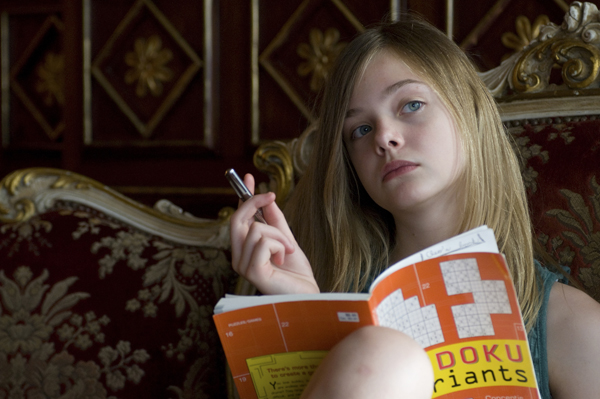
A trip they take together to Italy for a film premiere -- a reward worthy of a surrogate wife -- is interrupted by yet another clueless clingy ex-lover who in flagrant morning-after dishabille tries to make nice with Cleo by talking about her boyfriend when she too was 11. Cleo's own budding sexuality is sometimes jarring when she and Johnny are in bed together (surely evoking Malle's Murmur of the Heart when the mother and son also ended up in a hotel bed) but Dorff's shambling performance -- recalling Bill Murray's depressed hotel rat -- is as pitch perfect as Fanning's -- he's not portraying a brilliant or great actor, just a lucky guy who seems to have fallen into a career that demands little homework and a lot more red carpet, press conference, party and bullshit.
Coppola makes her second nod to narrative convention by also adding a deadline: Cleo is due at camp and Johnny has to take her there, one thing he can't screw up. Ever low-maintenance and organized, often popping up so he can chauffeur her to appointments he has forgotten about, Cleo even generates her own camp checklist, but her charming, easygoing veneer is finally pierced on the eve of their separation after a day at the gaming tables in Vegas, and he's equally despondent, making an entire box of spaghetti for himself and calling an old girlfriend who won't come to keep him company. When his car conveniently breaks down, well, you know the rest... by then this has become a buddy slash road picture that can only end one way.
Coppola's life was surely grist for her mill just as Truffaut's and Malle's were for their films and this is a very good thing. Some of the details -- helicopters and limos -- are more resonant because we imagine they come from her own experience. Coppola's mother Eleanor wrote a memoir of the turmoil of these years and Francis Coppola is known to have had agonies when the glory of the Godfathers had passed away. Still one treasures the doe-eyed view of this glittery world and empathizes even as it grows ever more rarefied.
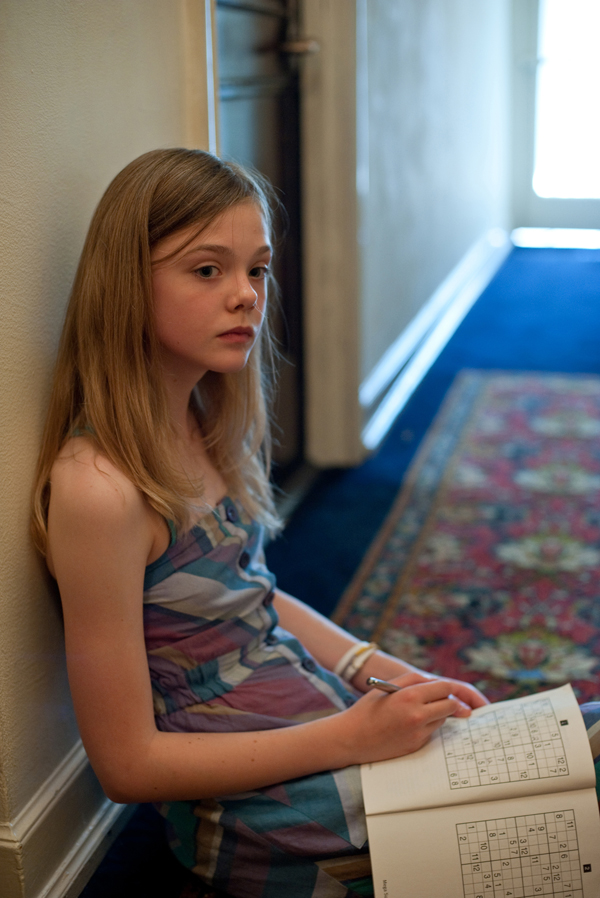
My father never did come to watch me at my ballet lessons or recitals, a thing I supposedly did with my mother. Now, all over Los Angeles and every other city, one can see fathers at practices, coaching, encouraging, even yelling. But when Johnny watches Cleo at the skating rink, it's a singularly affecting moment as we sense he finally sees her as a person in her own right. Cleo, like most of our children, is dedicated but only modestly talented, but he is as proud of her as if she had been Michelle Kwan landing a triple axel at the Olympics. This is the way it should be. Somewhere is an ode to the ego-boosting potential of the father-daughter mix.
I love that Coppola fille is not afraid to linger with her sequences, (also a very European style) and trust herself -- and her characters -- not to shy away from these affecting moments, but the close observation of these two lives and their entourage has not pleased everyone, even people who found Lost In Translation shaggy but lovable.
Still, we did not complain when Francois Truffaut and Louis Malle continually mined their own lives for small insightful moments about how hard it is to grow up. Is it the precision of growing up girl that has critics flummoxed? Geena Davis's Institute on Gender in Media at USC has found that from 2004 to 2009 of the 5,554 speaking characters in the films studied, 71 percent were male and 29 percent were female. Coppola doesn't like talking or certainly writing about her work unlike the French auteurs who couldn't get enough of navel gazing. Yet there is more than a soupcon of Godard's Patricia (Breathless) and Rohmer's Laura (Claire's Knee) or Chloe (Chloe in the Afternoon) in her girls and it would be interesting to one day hear more about her approach and her own view of her cinematic icons if only to further pass the torch.
Until then, the films speak very well for themselves.
All images courtesy of Focus Features by Merrick Morton. Sunbathing photo by Franco Biciocchi. Somewhere opens December 22nd in limited release.
